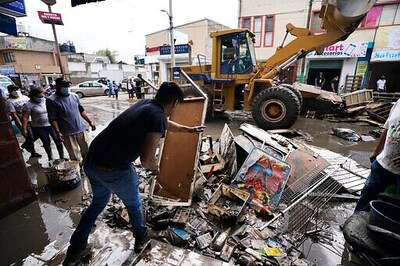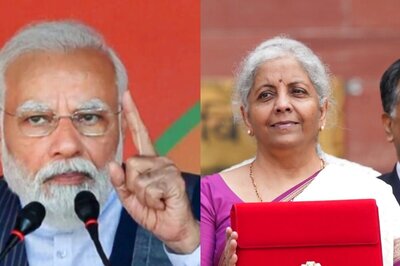
views
On CNBC-TV18’s special pre-budget series, What the World Wants, some of the big global market analysts and thinkers talk about the level of expectations going into the budget exercise.
This time, the level of expectations seems quite muted but given the kind of governance environment that we have had for the last few months, maybe the budget, if only as a signaling mechanism assumes some importance.
Below is a verbatim transcript of JP Morgan’s Adrian Mowat with CNBC-TV18’s Udayan Mukherjee.
CNBC-TV18: How would you describe the level of expectations this time around before the event?
Adrian Mowat: Almost zero. That’s the way I would describe them. It is definitely not a focus for international investors at this point in time. They have plenty of other things to worry about.
CNBC-TV18: Is that a good thing or a bad thing that we are going in with zero expectations?
Adrian Mowat: I suspect it’s a good thing. We have had, generally, some very negative news when it comes to Indian politics. We have had these whole series of scandals. We are finally getting a session of parliament. Hopefully, the budget goes ahead with 30 other Bills which the Indian government hopes to get through this session of parliament. That could improve people’s attitude towards Indian politics.
CNBC-TV18: Do you think anything can be achieved in this budget exercise to allay the fears on governance and the negative noise surrounding Indian politics at this point?
Adrian Mowat: They are very constrained in this budget. You have got the Fiscal Responsibility Act which they need to meet the target of reducing the fiscal deficit. At the same time, we are seeing subsidies for food and fuel rise as food and fuel prices increase. We are unlikely to get the sort of windfall that we saw with 3G telecom licenses.
The flexibility for the government is very limited and what investors will look for is a sensible realistic budget rather than one that assumes maybe very high growth and an increase in revenue that looks unrealistic. Let’s go for a pragmatic realistic budget and then the market might rally on the back of that.
CNBC-TV18: But what if he comes out and says that next years fiscal deficit target will be northward of 5% which seems quite plausible, given the environment that he is presenting the budget in and with a fairly largish attendant government borrowing program for next year, is that in the price or is that going to make the market nervous?
Adrian Mowat: If that’s what occurs, it will make the market nervous. When we look at what’s happening, it’s clear that the fiscal deficit will expand because of these subsidy commitments. Politically, it is quite difficult to push up prices of basic commodities of energy, particularly, in an environment where governments around the world are worried about inflation.
CNBC-TV18: You said that international investors have a lot more to worry about on their plate right now. With regard to India, what would those other things be?
Adrian Mowat: What international investors are worried about is really somewhat independent of India. We have an unfolding situation in North Africa with Libya now very unstable. It’s likely that production of oil in Libya is going to be disrupted. This is the sixth largest OPEC producer, producing 1.5 million barrels a day.
We are seeing unrest in North Africa and the Middle East – Bahrain and Algeria. So, markets are concerned about that. They are broadly concerned about a rising political risk premium throughout emerging markets. In that context, India looks good as it has a highly vibrant democracy. It doesn’t have the issues that have been apparent in places like Egypt and Tunisia. It looks like a lower risk political environment. Maybe it also helps that the markets sold off because of governance issues from November last year.
CNBC-TV18: Crude at more than $90 per barrel, worse still more than $100 per barrel makes us very nervous and it would make international investors investing in India nervous as well, would it not?
Adrian Mowat: Yes. My first point is - please stop looking at the West Texas Intermediate (WTI), Brent has been above a 100 for two weeks now. That is a far more relevant benchmark for energy consumers globally, particularly, India. Brent closed at 107.4 in Europe last night that is negative for India as crude oil importer. It is negative for India as it will expand its current account deficit and it will be negative in driving up either inflation or the fiscal deficit.
India is absolutely hit by that but remember that most EMs are oil importers. The only beneficiaries would be Russia and to some extent Brazil of a high oil price. Ultimately, the high oil price and potential disruption to production is going to be negative for global growth. You are going to see GDP and earnings numbers revised down throughout Ems. India might prove more defensive in that type of environment where the domestic growth engines are powerful.
CNBC-TV18: Are you then saying that a large part of the EMs underperformance and India in specific has played out already from the start of this year and that it might not work as a trade going forward to the same extent?
Adrian Mowat: There are a number of factors driving the outperformance of developed markets versus the Ems. The negative or the cyclical headwinds in Ems has been rising inflation and the potential central bank policies. Now, the rise in inflation is going to continue with this move in oil prices. I see no reason to suggest that the headwind that is in place is going to decline.
Political risk premium is rising in Ems, which is another reason for the underperformance. The absolute performance of the developed markets has been driven by good economic data in both, Europe and the US. Last night, we had some very good manufacturing data out of Germany; the US data looks pretty robust.
If there is a threat to that, it is that inflation is rising throughout the world driven by primary products, energy and food, that will crimp discretionary spending in both EMs and developed countries. We could begin to see this growth trade in developed markets beginning to fade as we enter the second quarter. Maybe that is when developed market outperformance begins to end.
CNBC-TV18: What’s easier to justify in your eyes as we go into the second quarter? Is it that developed markets correct now after their outperformance and emerging markets actually do well or maybe developed and emerging markets actually come off a little bit, in that sense both move in one direction?
Adrian Mowat: I expect both to move in one direction and that’s the wrong direction which is downwards on the back of what’s going on in the Middle East and North Africa. We see a correction in the S&P after a very strong run. Emerging markets are likely to have a beta above 1 to that correction. The EM index would go bellow 990, so a correction of about 15 per cent from its recent highs. We are currently at 1,100.
India has a fundamental high beta in that it runs a current account deficit, so, it is quite dependent on flows. India has been underperforming in this correction and was early in peaking late last year. India probably declines as fast as emerging markets (EMs) but it is probably, one of the markets that I am looking to buy as the correction unfolds.
I am also going to be looking to buy the Association of South East Asian Nations (ASEAN) region and places like Turkey where the fundamentals are strong. It is very important to understand that the Chinese response to inflation threat is to push up wages. China is going to have a much more serious core inflation problem. That may benefit other countries as China slows down growth which may benefit other countries, as we see a migration of jobs away from China to the ASEAN region and possibly, even India.
CNBC-TV18: If 990 is your target and you expect to see India move inline with the MSCI, from this level of 18,000 that would drag us back all the way to 16,000 Sensex. Do you think the bottom for India might lie somewhere around those levels?
Adrian Mowat: Yes, that would be consistent with our view on the MSCI emerging markets.
CNBC-TV18: What would make investors happy and spark off a reasonable chance of some near-term pop post the budget. If you have to pick one or two things what would those be?
Adrian Mowat: There is a delivery of a pragmatic budget that addresses some of the concerns that doesn’t appear to be too populist, then the speedy approval of the budget by the Lok Sabha is very important. We have had political deadlock in India for a protracted period of time. We need to get the budget past and look at other forms of reforms, whether its land reform, looking at the mining sector, all these acts of parliament need to be passed efficiently and that’s what the market is going to look at.
CNBC-TV18: Anything specific on infrastructure because that’s a space which has got absolutely bludgeoned in India. Anything in the budget that might help it?
Adrian Mowat: I would expect the normal talk about prioritizing infrastructure which we see in most budgets. Investors are a little bit cynical about that. What they are looking for is an efficient, transparent process for approving infrastructure projects. The issue in India isn’t the availability of money; it is the efficiency at which infrastructure projects are approved. This covers many different ministries, many different actions. That’s what we are really looking for rather than yet another budget taking about infrastructure.
CNBC-TV18: Would issues like clarity on GST or pending bills on FDI in insurance or retail, feature on the expectation list at all?
Adrian Mowat: I would have thought for just general boost in sentiment if there is an increase in the amounts of investments or the shareholding stake that you could have in insurance or in retail for foreign investors. That would generally be seen a as a positive. I don’t think there are major issues for India’s growth dynamics but it would help sentiment.
CNBC-TV18: We have seen some outflows this year. When you speak to your clients, what is the sense you get? Is it that people who had to sell have sold or is there a lot of money which might just go out if the market rebounds somewhat in India?
Adrian Mowat: Asset allocation is a bit more like turning a super tanker rather than flicking a switch. You will see further outflows from EM equity funds. If I am a retail investor, switching on the TV right now, I see some pretty nasty images coming out of Libya that is unlikely to make me want to buy EMs. It might make me pull the trigger and sell some more of my EM funds and just stay at home and put the money into the S&P.


















Comments
0 comment